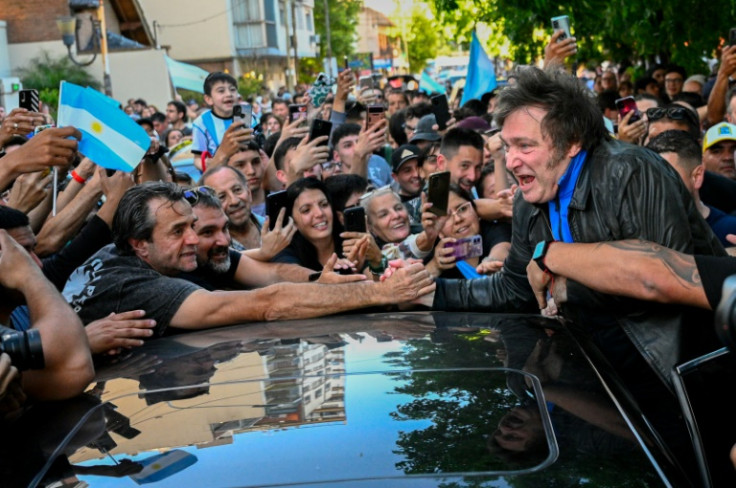After US, Brazil: Argentina Battles Unfounded Electoral Fraud Claims

Without proof, or any complaints filed, claims of electoral fraud have been shared tens, sometimes hundreds of thousands of times on social media accounts backing Argentina's ultra-libertarian presidential candidate Javier Milei.
Like Donald Trump, defeated in the US elections of 2020, or Brazil's far-right Jair Bolsonaro who lost the vote last year, outsider Milei has himself helped fuel suspicion ahead of a runoff on November 19 in which he will face economy minister Sergio Massa.
On pro-Milei sites, videos of torn ballot papers or provisional counts that differ from the final result -- which election officials say is quite common -- have sought to cast doubt on the process following the October 22 first round.
Anti-establishment Milei came second out of five candidates in the first voting round, garnering nearly 30 percent of the vote behind Massa with 36.7 percent.
AFP Fact Check has disproven the veracity of many of the images being shared.
Some were spread by right-wing political consultant Fernando Cerimedo, who is also known to have disseminated unproven claims of cheating in the Brazilian election won last year by leftist Luiz Inacio Lula da Silva.
Recently, Milei's spokesman Guillermo Francos proffered: "I will not say that there was fraud" in the first round of voting in Argentina, for a lack of concrete evidence.
Yet Milei this week, in an interview on YouTube, claimed there had been "irregularities of such magnitude that they cast doubt on the result."
Last weekend, a march against alleged electoral fraud gathered a few hundred Milei supporters in Buenos Aires, though images on social networks showed mass gatherings from other, unrelated events.
Amid the onslaught, Argentina's National Electoral Chamber, which interprets voting legislation, issued a statement denouncing "unfounded claims of fraud that misinform public opinion and undermine democracy."
It said that in the 40 years since Argentina returned to democracy, there have been "33 national electoral processes of various types, all with accepted, recognized results and indisputable legitimacy."
For the first voting round, the CNE received 105 reports of suspected wrongdoing -- a number consistent with other elections, the agency said.
To date, no political party or individual has filed any formal complaint concerning fraud or irregularities, the CNE added.
Alejandro Tullio, Argentina's national director of elections from 2001 to 2016, told AFP the "fraud narrative" was nothing new -- "already observed in several countries."
Its purpose, he said, is "to undermine the credibility of an election, or its supervisory authorities... (a) malicious delegitimization of results."
According to political analyst Carlos Fara, it is a well-known strategy to "question the rules of the game if they did not favor the complainant."
"We saw it with Bolsonaro, with Trump, and now we see it with Milei," he told AFP.
"This is the typical alibi: if I won it's despite the fraud, if I lost it's because of the fraud," said Fara.
Political newcomer Milei burst onto the scene vowing to dollarize the struggling Argentine economy, get rid of the central bank and slash public spending, firing up a population desperate for change.
He is anti-abortion and pro-gun, and delivered his message with props such as a powered-up chainsaw he took on the campaign trail.
Milei is an admirer of former US president Donald Trump and had a son of Bolsonaro support him in his campaign headquarters on election night.
© Copyright AFP 2024. All rights reserved.











